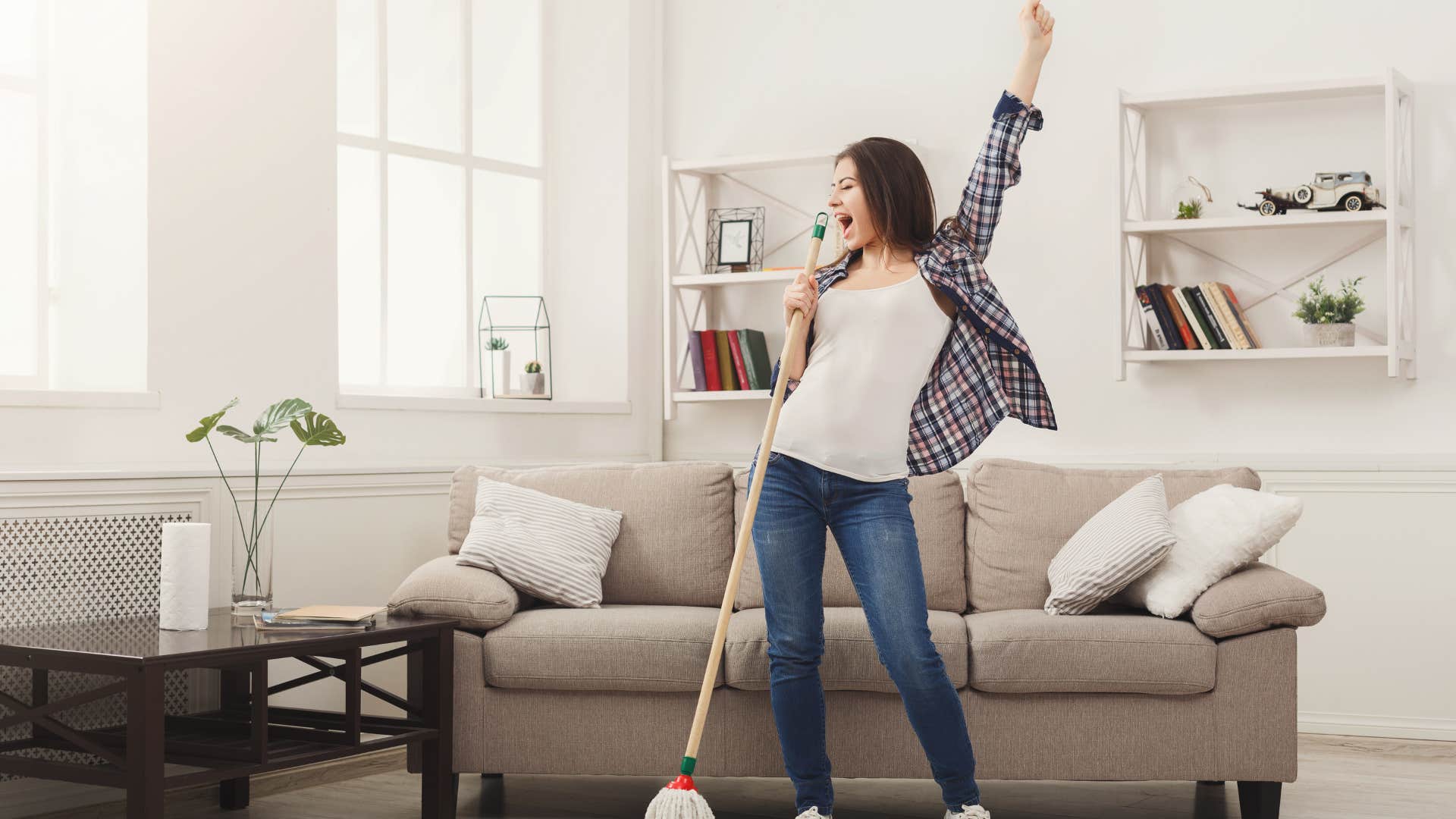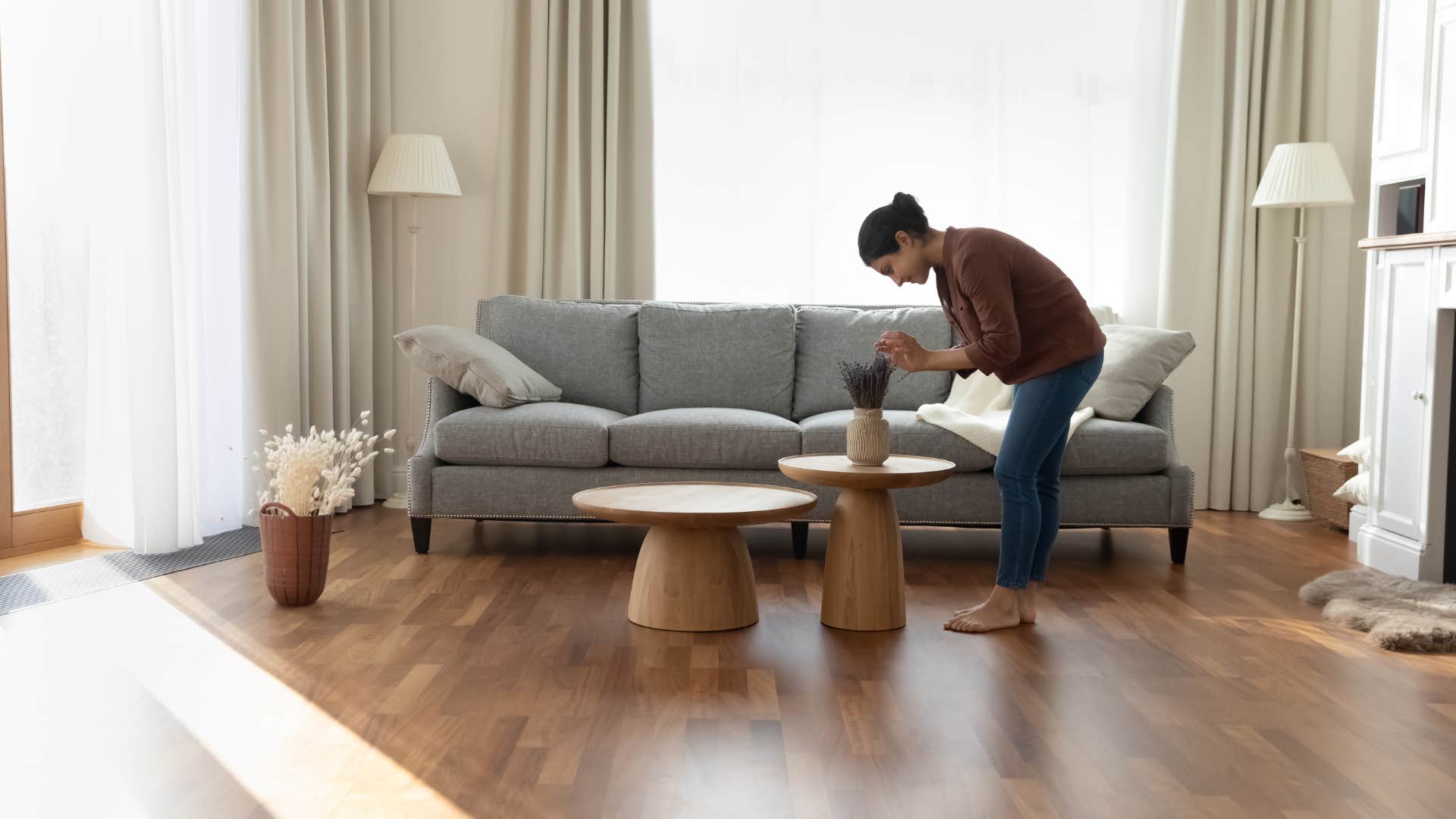People Who Keep Their Homes Spotless Swear By These 6 Weekly Routines — No Deep Clean Required
If you're too busy to deep-clean your house, here are a few small things to do instead.
 Getty Images | Unsplash
Getty Images | Unsplash Despite recent evidence suggesting that a cluttered desk leads to a creative (not cluttered) mind, I'm determined to declutter. It's difficult to be creative when you can't find your ideas buried in piles of articles, legal pads, and journals, or elsewhere on tiny scraps of paper and sticky notes. Not that you could tell by looking, but I prefer the aesthetic of a neat, organized workspace.
Maintaining a clean and organized space doesn't have to be a multiple-hour ordeal that ends with a sore body. The secret lies in creating a simplified routine that works best for you and avoids overwhelming you.
People who keep their homes spotless swear by these six weekly routines, no deep clean required:
1. Identify the problem area
 Prostock-studio / Shutterstock
Prostock-studio / Shutterstock
Name it so you make the change you want clear — having spent a marathon weekend clearing out the detritus of a project I recently completed, my goal is to remain clutter-free.
By pinpointing where clutter accumulates or where cleanliness lapses occur, individuals can develop targeted strategies to address those specific areas. Research has found that this might involve creating a dedicated "home" for items that consistently end up out of place or setting a small, regular routine for a particular problem spot.
2. Problem-solve for that space
 PR Image Factory / Shutterstock
PR Image Factory / Shutterstock
Once you've identified the change you want, it will not come to you magically, à la the so-called law of attraction. You must consider possible actions you can take to achieve your goal.
There are a number of ways I can stop cluttering up my study. I can resolve to put every paper, article, or idea where it needs to be when it comes across my desk. Whoever said you should only touch each piece of paper once was right, and the same applies to email and internet articles.
A 2013 study explained that keeping a spotless home involves continuously facing and resolving minor issues like unexpected spills, accumulated clutter, or persistent dirt and odor problems. Effectively tackling these problems requires a systematic approach, including identifying the specific issue, brainstorming potential solutions, weighing their pros and cons, and implementing the most effective approach.
3. Choose a solution
 Roman Samborskyi / Shutterstock
Roman Samborskyi / Shutterstock
It doesn't matter what you choose, as long as you believe you can get behind it. I'll try a weekly strategy, taking Saturday afternoon, when I'm usually semi-brain-dead from a long run anyway, to declutter the prior week's accumulation.
Research suggests that breaking down cleaning into smaller, manageable tasks and establishing a regular routine can help people maintain a spotless home without resorting to frequent deep cleans. This approach leverages the principles of habit formation and positive reinforcement, making cleaning a less daunting and more sustainable practice.
4. Evaluate your progress
 fizkes / Shutterstock
fizkes / Shutterstock
You'll need a way to track what you're doing. There's an app for that, but a diary or hash marks on a calendar, noting daily whether you've cleaned or organized, will do.
After two weeks, I'll be able to tell if my weekly strategy is working since the absence of piles will be concrete and measurable, literally. You can consult your daily record to see how often you've been talking to people, your kitchen to see if you've been keeping the junk out, or your calendar to see how frequently you've walked.
Tracking your progress and seeing the tangible results of your cleaning efforts acts as a positive reinforcement, making you more likely to repeat the desired behaviors. Studies suggest that people who are good at self-control tend to structure their lives and monitor their progress, which can help in forming new habits like regular tidying.
5. Revise your plan
 Okrasiuk / Shutterstock
Okrasiuk / Shutterstock
If your evaluation tells you you're not cutting it, or if you are, and you're ready to bump it up a notch, consider your next move. If my study is without piles, I'll probably stick to my plan and add to it by working on some other areas of my world that need decluttering. If my plan's not working, I might go from a weekly to a twice-a-week attack.
A 2016 study explained that by shifting the focus from infrequent, overwhelming deep cleans to consistent, manageable cleaning routines, individuals can leverage the benefits of cleanliness to maintain a spotless home and enhance their overall well-being.
6. Reward progress
 fizkes / Shutterstock
fizkes / Shutterstock
Often, progress is its own reward. I expect my clutter-free environment will be both aesthetically and practically gratifying. Sometimes a concrete reward is in order. Small gifts to yourself for a job well done can help keep you motivated.
One of the biggest problems I encounter among my clients is a feeling that they have to make changes that other people think they should make, using strategies that others tell them will work. You must decide on the change you want in a way that feels right for you.
While a small treat can be helpful, excessive reliance on material rewards can shift focus from the intrinsic benefits of a clean home to the reward itself, potentially diminishing long-term motivation. An article by Utah State University suggested that framing cleaning as an investment in your well-being, rather than a burden.
The beauty of these steps is that they provide a structure while still allowing for flexibility. You can experiment until you find a plan that works for you.
Dr. Judith Tutin is a psychologist and certified life coach who offers life coaching and psychotherapy services to address divorce recovery, relationship stress, parenting challenges, work-life balance issues, health and wellness concerns, and living a happy and fulfilled life.

